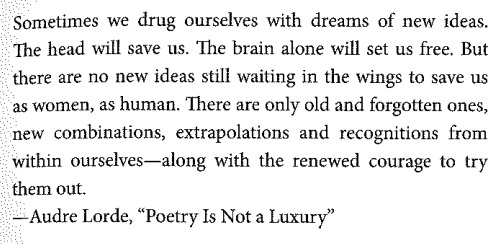#afrofabulations
Text

epigraph to Afro-Fabulations by Tavia Nyong'o
#q#lit#quotes#literature#typography#audre lorde#poetry is not a luxury#afrofabulations#tavia nyongo#sanctum#portrait of the artist#m#x
488 notes
·
View notes
Link
An afrofuturism tale based on an African-American folk hero.
#afrofuturism#Folklore#Black history#John the Conqueror#high john the conqueror#folk tales#African-American folklore#short stories#narratives#African-American speculative fiction#afro indigenous#afrofabulation#Folk heroes#Black migration#the great migration#alternate history#tales from the hood#urban legends#space is the place#P-Funk#parliament-funkadelic#Sun Ra#brother from another planet#the man who fell to earth#melanatedmagic#melanated#melanatedandproud#black stories matter#the mothership#the mothership connection
1 note
·
View note
Photo

The Pullman Rabingha in Douala, Cameroon is in a shocking state, desperate for a total refurb, but I guess the silver lining is that this fabulous conversation pit in the lobby is still just as it was in the disco era. Photo February 2019 Bauzeitgeist.
#interior design#interior architecture#vintage interior#conversation pit#design#vintage design#1970s architecture#disco era#afrofabulous
63 notes
·
View notes
Photo

Racisme à temps plein à la @ratp , comme vous pouvez le voir, le profilage racial est dans leur ligne de conduite : mon cousin vient de m'envoyer ça. Quand il est arrivé en France, je lui ai donné mon exemplaire de Marianne et le Garçon de @afrofabulous Je lui ai parlé de la police, des contrôleurs dans les transports en commun, du flicage de son corps d'homme Noir, et lui, tout content d'être là, me sortait des "Mais est-ce qu'ils ont le droit ?" et des "Mais je suis Français !" J'espère que vous penserez à offrir @ahsissi.zeroman à toutes vos cousines qui débarquent du pays, et Marianne et le Garçon Noir aux cousins. Vous verrez, ça leur fait gagner du temps. . . . . . . . . . . . #shortstories #joguestin #jogustin #storytelling #briefencounter #randomstory #randomstories #fergusonaparis #sadstories #histoirecourte #anecdote #anecdotes #anecdoteoftheday #anecdotedujour #racisme #negrophobie #ratp https://www.instagram.com/p/B031hYkjgfT/?igshid=3zttx9ng2h57
#shortstories#joguestin#jogustin#storytelling#briefencounter#randomstory#randomstories#fergusonaparis#sadstories#histoirecourte#anecdote#anecdotes#anecdoteoftheday#anecdotedujour#racisme#negrophobie#ratp
0 notes
Photo

Dans les bacs. Le nouveau Jo Gustin. Présence Africaine. #livreparis2019 #literature #litterature #bookworm #bookstagram #chezgangoueus #jogustin @joguestin #presenceafricaine @chrystelle_totanga @vidareads @afrofabulous (à Paris, France) https://www.instagram.com/gangoueus/p/BvM9TPoH5vk/?utm_source=ig_tumblr_share&igshid=1jslq6wmr8g1u
#livreparis2019#literature#litterature#bookworm#bookstagram#chezgangoueus#jogustin#presenceafricaine
0 notes
Link
Download Best Download SVG Cut File Best Quality
0 notes
Link
Download Free Commercial Use SVG Files for Silhouette, Cricut High-Quality
0 notes
Photo

Bonjour à tous, un post sur l'excellent livre de Leonora Miano , la saison de l'ombre, prix Femina 2013. C'est un livre puissant, écrit de manière magnifique. Dans ce livre, l'auteure raconte l'histoire d'un clan victime de la traite négrière à l'intérieur de l'Afrique Subsaharienne. Elle va évoquer la souffrance, la douleur, l'incompréhension de tous ceux à qui on a enlevé , volé un être cher. On va assister à la destruction de ses clans suite aux rafles négrières , à la perte culturelle et d'identité. Le livre est fort bien documenté. Des personnages charismatiques , notamment les femmes, les dialogues sont écrits en italique , sans aucun tiret , aucun guillemet... Qu'est il arrivé dans ce village , pourquoi 12 hommes ont ils disparu , sont ils encore vivants , pourquoi ne peut on pas communiquer avec eux spirituellement......et comment faire un deuil, quand on ne peut mettre en place des rites funéraires. 3 grandes voix s'élèvent dans ce récit : - celle du jeune chef Mukano parti à la recherche des disparus. - celle de Eyabe , qui va prendre la route jusqu'à l'océan où elle découvrira la réalité des razzias négrières - celle de Ebeise , accoucheuse restée au village. Un roman de mémoire superbe , qui laisse une grande place au mysticisme. A découvrir, si vous ne le connaissez pas. #lasaisondelombre #leonoramiano #editongrasset @editionsgrasset @afrofabulous #instalire #lire #lecture #book https://www.instagram.com/p/BeazejSnO7G/?utm_source=ig_tumblr_share&igshid=g820oyc6hvox
0 notes
Photo

Nouvelles acquisitions . . Crépuscule du tourment de @afrofabulous chez @editions_pocket et on regrettera plus tard d’@agnesledig aussi chez @editions_pocket. . . La couverture du livre de Leonora est magnifique ! . . Pour ceux et celles qui sont intéressées, et résident à Libreville, vous les trouverez à Mbolo. . . À bientôt
0 notes
Text
The Oceanic Feeling
Tavia Nyong'
Nineteen-year-old Christopher Breaux fell hard for another straight-acting boy who wouldn’t love him back, confessing his love in a car parked in front of the girlfriend’s house. Like many a millennial, he took to Tumblr to share his feelings about a love he described, with portentous adolescent drama, as “malignant.” But the queerest song released so far by the artist now known at Frank Ocean hasn’t been an ode to boy-on-boy love and lust but a corrosive satire of “traditional” American marriage in the era of Kim Kardashian and Newt Gingrich. If hip-hop is the CNN of the ghetto, then “American Wedding” aims to be its TMZ as well, replete with celebrities and courtroom hijinks, muscle motors, and divorce settlements, with Ocean ruefully rubbernecking at all the car crashes en route to the good life.subscribe to TNI for $2 and get Vol. 9 today
“American Wedding” has attracted the proprietary attentions of paleo-rockers the Eagles, whose radio staple “Hotel California” the track is based on. But the real story here isn’t about the sampling wars. It’s about a scapegoat generation struggling to find a path through the crumbling infrastructure of the American dream.
It has been said that while liberals won the culture wars of recent decades, the right won the political and economic ones. The absurdly elevated status of “marriage equality” as the ne plus ultra of gay rights is a symptom of this unhappy dispensation. Who wants equality, after all, on such threadbare terms? Sensing a bait and switch, Ocean takes down love, American style, in merciless couplets like:
She said, ‘I’ve had a hell of a summer,
so baby, don’t take this hard
But maybe we should get an
annulment, before this goes way
too far.’
Like Pretty Woman in reverse, “American Wedding” descends from true love to crass commercial exchange, reminding us on the outro that “we been some hustlers since it began.”
But this deconstruction of romantic comedy is done in the name of a different, murkier ideal of love, a redemptive love that won’t quite fit into the comforting melodic or narrative resolution of pop culture. We heard strains of such a love on Ocean’s performance at the 2012 VMA awards, where he delivered an assonant, astringent version of “Thinkin Bout You,” the opening track on Channel Orange. He wonders if his beloved is willing to “think so far ahead, cuz I’ve been thinkin’ bout forever.” But such a horizon can clearly no longer find expression in the shelf-worn sentiments of “till death do us part.” The ass-backwardness of the Eagles’ litigious response to Ocean’s meditation on love and commitment is best captured by NCWYS in the SoundCloud comments to “American Wedding”:
If you older people think that the younger generation is out of control and doing everything incorrectly then you should absolutely love this song, but you don’t.
Ocean is a practiced journeyman of popsoul songcraft, as the early demos on the fan-compiled Lonny Breaux Collection prove, but his writing on Channel Orange makes his preceding material for other artists seem like throat clearing. On “Sweet Life,” a sharply observed reverie of black-picket-fence California dreaming, Ocean sardonically queries his pampered date: “So why see the world, when you got the beach?” He elongates “world” to contrast with the punched out “beach” in a way that tells us everything we need to know about his mournful acceptance of life’s cruel optimism. “Sweet Life” makes the extended parable of parental neglect on “Super Rich Kids” almost superfluous, except for the self-conscious scene setting it adds—mixing substance abuse and class snobbery into a potent cocktail of something called “upward mobility”:
We’ll both be high
The help don’t stare
They just walk by
They must don’t care.
This is the way Ocean inherits the past: not by respecting tradition, or Don Henley, but by staring down the foreshortened horizons and complacent inequality that the frantic pursuit of wealth or happiness brings.
Not that Ocean is lecturing, mind you, although Sierra Leone, sex work, global warming, and the hijab all make appearances in his rapidly expanding oeuvre. He is singing over the soundtrack of history, blunting its force with tried and true teenage tactics of insult, grandiosity, and desperate need. At 24 he isn’t quite old enough to know that he shouldn’t care, which is why he can gloat over “expensive news” on a pricey widescreen one moment, and say “my TV ain’t HD, that’s too real” in another. His is a realism that needs to be able to blur out of focus when it’s too intense or not intense enough, and the drugs come in handy. But so does channel surfing; on Channel Orange television is his angel of history, a flickering window onlooking the mounting wreckage of the past as he is blown into the future.
Despite his Tumblr post comparing the intensity of same sex love to “being thrown from a plane,” the theme of Channel Orange is less sexual orientation than chemical disorientation. Recreational substances surface frequently, often as a metaphor for a relationship gone wrong. Or is it the other way around, and addiction is now the core, common experience a generation is struggling to give sense to, turning to romantic clichés like “unrequited love” in a search for a more familiar, respectable language for it?
Frank’s oceanic feelings on Channel Orange crash in waves that obliterate distinctions between gay, bi, or straight. Some of the ostensibly straight songs, except for their pronouns, feel suspiciously same-sex. And when heterosexuality is foregrounded, it never resolves any confusions, it only produces new ones. The artistic showpiece of the album, the ten-minute long “Pyramids,” is an afrofabulation of ancient Egypt and postmodern Las Vegas, centered on a woman dressing for her job as a stripper, while her man looks on, waiting for her to “hit the strip” and “keep my bills paid.” But the song is a far cry from big pimpin’. “Pyramids” is drenched in delusions of the good life in a “top floor motel suite,” cruising on empty confused for the upward mobility that is now as rare as water in the American desert. Ocean has a heartfelt respect for his Afrocentric queen—“we’ll run to the future shining like diamonds in a rocky world”— but the feeling tone of “Pyramids” is closer to Janelle Monáe’s “Many Moons” than Michael Jackson’s “Remember the Time.” That is, where Jackson celebrated an image of a past in which we were kings and queens, Monáe and Ocean take a fish-eye view of a society where a multihued social apex rests atop masses of brown, black, and beige bodies “working at the pyramid,” like the slaves who built the original ones.
Where CNN anchor Anderson Cooper justified his belated coming out in terms of the reporter’s obligation not to get in the way of the news, Ocean knows better. A black boy is always getting in the way of the news. At 18 he fled Hurricane Katrina for Los Angeles. But as Fred Moten put it, “I ran from it, and was still in it” pretty much sums up the black experience in America. Channel Orange starts in a similarly fucked-up atmosphere—“A tornado flew around my room”—and ends with “Forrest Gump” perhaps the most oddball musical portrait of same-sex love since “Johnny Are You Queer?” A three-legged race featuring Tom Hanks’ dimwitted but fleet-footed hero and Christopher Breaux’s beau, “Forrest Gump” boils Hollwood sap down to a lubricious bump and grind:
my fingertips and my lips
they burn from the cigarettes
forrest gump
you run my mind boy
running on my mind boy
“Forrest Gump” is rhythm and blues as dark camp, nostalgia repurposed by a generation too young to remember, a generation whose cultural thefts seem premised on the awareness that anything original they create could be stolen.
But don’t confuse Ocean’s approach for pastiche or retromania, despite his affection for old cars and the vocal stylings of Prince, Stevie Wonder, and Donnny Hathaway. Just when you think he is recycling the familiar, he gives you something incredibly raw and real. On his first appearance on broadcast television, Ocean scaled the national-media echo chamber down to a backseat taxicab confessional, sharing a universal angst at a human level rarely captured by the contemporary celebrity coming out, with its strict protocols for explaining the murkiness of desire away:
He said Allah Hu Akbar
I told him don’t curse me
Bo Bo you need prayer
I guess it couldn’t hurt me.
“Bad Religion” leaves it unclear whether it is his taxi driver’s effusive piety or his own devotion to the cult of true love that is more stunning. Confusing spirituality with a therapy designed to sand our sharp edges into shape for this world, Ocean is awestruck in a way that has little to do, in the end, with either Islamophobia or homophobia.
Rather, “Bad Religion” finds a pivot point in the “and” of Freud’s Civilization and Its Discontents, the book where Freud psychoanalyzed the oceanic feeling of cosmic oneness felt by natural mystics and prophesied that our adjustment to society would only ever leave us frustrated and unhappy. “The price we pay for our advance in civilization,” Freud warned, “is a loss of happiness through the heightening of the sense of guilt,” and “Bad Religion” has plenty of guilt to spare. But it also never fails to convey the sense of striving and resilience Freud grudgingly acknowledges when he notes, “We are never so defenseless against suffering as when we love, never so helplessly unhappy as when we have lost our loved object or its love. But this does not dispose of the technique of living based on the value of love as a means to happiness.”subscribe to TNI for $2 and get Vol. 9 today
Blown from New Orleans by the unnatural calamity of racist and economic neglect, separated from his beloved by lack of reciprocation, Ocean never stops striving for “the technique of living based on the value of love.” Whatever, wherever that may be. Even a curse, after all, probably couldn’t hurt him.
When Ocean, on his Tumblr, greeted us as “human beings spinning on blackness,” he invited us into that cab alongside him, but also onto the edge of that oceanic feeling of cosmic oneness that Freud could only associate with regression, so convinced was he that satisfaction was something all humans left in the womb.A version of this essay first appeared at Bully Bloggers
But spinning on blackness needn’t be just an image for depression, addiction, burn out, or malignancy. It could also be Ocean sidling up in an undercommons of prayer and malediction, where the singular soul brushes up against the dark night of the universe. Maybe that’s why a conventional coming out, with its endless reiterations of the transparently obvious and anodyne, seems beside the point. Frank Ocean isn’t like you or me; he isn’t even much like Christopher Breaux any longer.
https://thenewinquiry.com/essays/the-oceanic-feeling/
0 notes

